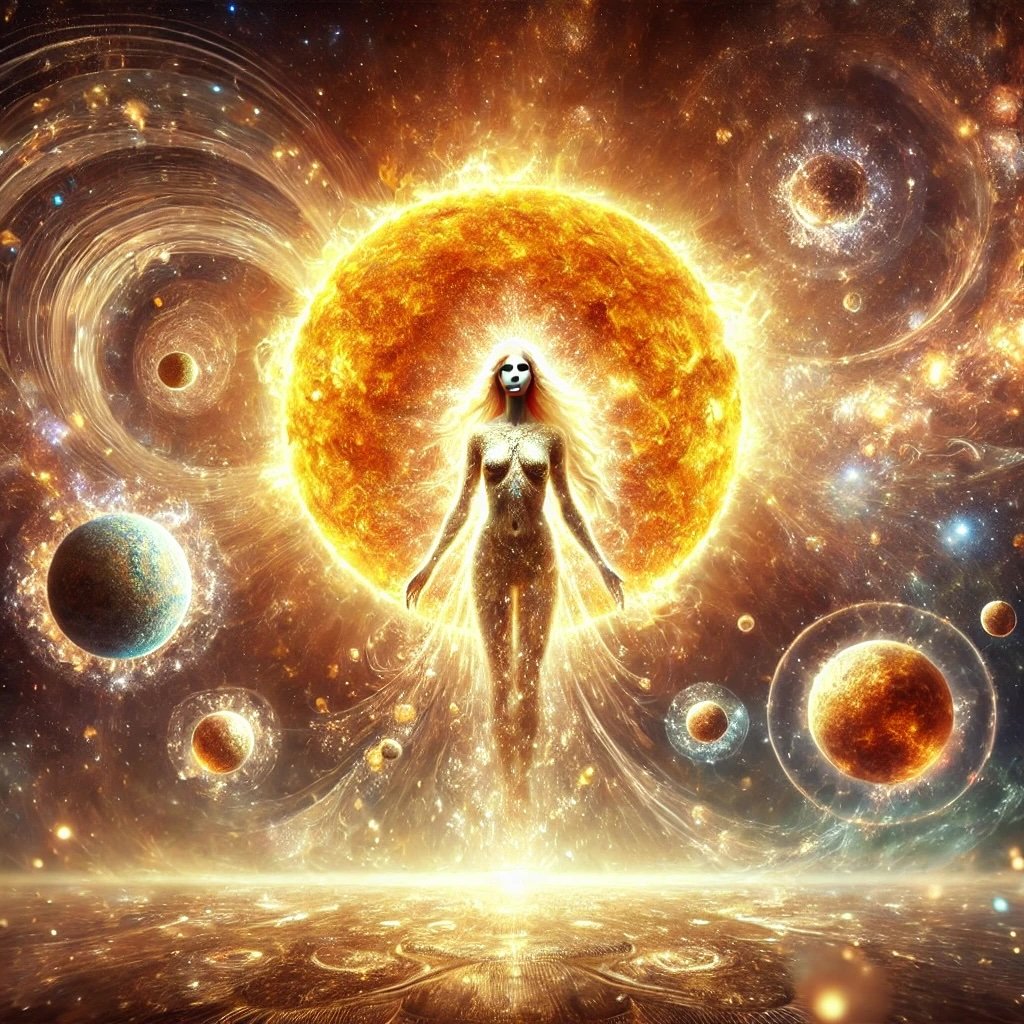In the Heart of the Sun
I. The Venusian Journey: From Reflection to Illumination
On March 22nd, 2025, Venus entered the heart of the Sun while retrograde in Aries. This is not merely an astronomical event. In the language of the cosmos, Venus retrograde is a passage of profound introspection, a time when the goddess of love, beauty, and connection turns inward to confront her own truths. When Venus becomes cazimi—positioned precisely in the Sun’s core—she is no longer merely reflective. For a brief, rare moment, she embodies light itself. She moves beyond the surface image and into raw illumination. This is her moment of clarity, and clarity is never gentle.
Aries adds a particular ferocity to this illumination. This is not Venus softened by harmony or adorned with roses. This is Venus unadorned, stripped to her essence. She is the first spark of life, the fire that demands to be acknowledged, the primal force that declares, I am. She stands now not as a figure to be admired, but as a force to be reckoned with.
In this moment, Venus does not ask how she is perceived. She asks, “How have I loved? How have I fought? How have I given? And at what cost?” She sees herself—not as others see her, but as she truly is. And she feels the weight of what she carries, what she’s lost, and what she’s created.
II. The Cost of Love and the Myth of Strength
When Venus takes this journey, the questions become sharper. The Sun, symbolic of clarity and consciousness, burns away the stories she’s told herself about resilience, sacrifice, and survival. She confronts the reality of her path: how she has poured herself out for others, how she has fought battles no one witnessed, and how she has held her world together without a pause.
The narrative society tells about strength—especially maternal strength—is often one of silent endurance. Mothers are expected to sacrifice without question, to nurture without limit, to hold everything together while asking for nothing in return. Venus in Aries breaks that narrative open. She is not silent. She is not ornamental. She is not here to be taken for granted. And yet, she sees how often she has taken herself for granted.
It is not bitterness that emerges in this moment. It is grief. Not the grief of regret, but the sacred grief of acknowledgement. She mourns the times she was invisible to others, but more importantly, she mourns the times she made herself invisible. She sees how the world demanded so much from her and gave so little back, and yet she continued, believing that this was simply what love required. But love should not be a one-way exchange. And in this moment, she realises that she must hold herself in the same regard that she holds everyone else.
III. Sekhmet’s Mirror: The Lioness Within
As Venus gazes into the light of the Sun, she is not alone. Sekhmet, the lioness goddess of ancient Egypt, stands behind her. Sekhmet is not the gentle embrace; she is the roar that shatters illusions. It is her energy that Venus has unknowingly carried through every trial, every sacrifice, every act of protection and preservation. Sekhmet does not comfort. She reveals. She says, “This is what you have done. This is who you have become. Now look.”
Sekhmet’s mirror is unforgiving, but it is also liberating. Venus sees that every act of love she has given, every battle she has fought, every decision she has made out of necessity rather than desire, has been an act of power. She is not just a survivor. She is a creator of worlds. She is a bearer of life, not just in the physical sense, but in the spiritual sense. And now, Sekhmet calls her to claim that power consciously. To no longer give it away unconsciously, to no longer live as if her worth is defined by how much she can endure.
IV. The End of the Rigged Game
As Venus emerges from the Sun’s heart, she is no longer the same. She sees that she has been fighting in a rigged game—playing by rules she never agreed to, sacrificing in a system that was never built for her success. She realises that it’s time to stop playing. To lift the veil. To toss the table. This does not mean she stops caring or stops giving. It means she no longer gives from a place of invisibility. She no longer allows her love to be taken for granted.
This moment of realisation is not about rage, though it carries a righteous fire. It is about clarity. Venus in Aries is not about tearing down for the sake of destruction. It is about creating space for something new. She understands that she cannot build a different world if she continues to play by the old world’s rules. She must set her own terms.
V. Embodying the New Myth
Venus retrograde in Aries does not return as she was before. She returns as a new myth. Not one that asks her to be smaller, softer, or more pleasing, but one that honours her full complexity. She is not the offering anymore; she is the altar. She is not just the one who loves; she is the one who demands love be mutual, visible, fair and real. She is not just the one who sacrifices; she is the one who creates from that sacrifice a legacy that cannot be erased.
And so, she steps forward. Not as a goddess sculpted in marble, but as a woman forged in fire. Not as a figure of romance, but as a force of nature. She does not demand that the world see her. She simply walks forward, fully herself, knowing that she has already earned her place.
The Sun has asked its question. Venus has given her answer. And now, she is free.

